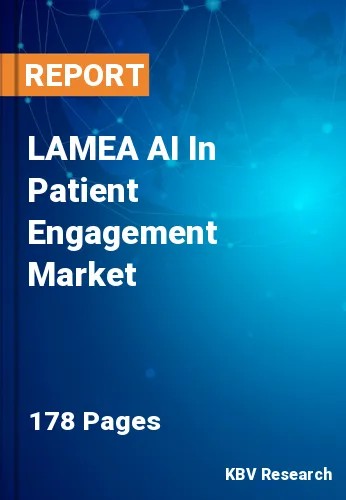The Latin America, Middle East and Africa AI In Patient Engagement Market would witness market growth of 26.1% CAGR during the forecast period (2023-2030).
Artificial intelligence (AI) technology is spreading throughout business and society, and its applications in healthcare are beginning to take shape. These technologies have the potential to revolutionize many different aspects of patient care along with the administrative processes that are involved in the operations of pharmaceutical companies, healthcare providers, and payers. Numerous studies indicate that AI can do critical healthcare jobs, like disease diagnosis, just as well as or even more effectively than humans. Algorithms are currently exceeding radiologists in identifying malignant tumors and assisting researchers with creating cohorts for expensive clinical studies.
Healthcare is already being impacted by massive amounts of data, artificial intelligence (AI), and machine learning (ML) in several ways, from treatment and diagnosis to routine administrative tasks like scheduling and monitoring regulatory compliance. The most obvious, though, is perhaps how AI is revolutionizing patient adherence and engagement—at least for patients. Patient involvement is sometimes considered the "last mile" of healthcare delivery, and AI and ML might have a significant impact here.
Patient-centric communication, secure messaging, virtual visits, online scheduling, secure messaging, and outreach capabilities on cell phones drive growth in the regional healthcare sector. The rapid expansion of the demand for electronic medical records in Brazil has led to a boom in patient engagement solutions. When compared to assessments made by humans, the numerous surveys carried out in Zambia about the employment of AI in the diagnosis of diabetic retinopathy revealed noteworthy and encouraging outcomes. Thus, it shows that there is tremendous promise in the possibilities that AI offers in transforming and improving healthcare in the LAMEA region, thereby expanding the growth opportunities of the market.
The Brazil region dominated the LAMEA AI In Patient Engagement Market by Country in 2022 and would continue to be a dominant market till 2030; thereby, achieving a market value of $280.6 million by 2030. The Argentina region is showcasing a CAGR of 26.8% during (2023 - 2030). Additionally, The UAE region would register a CAGR of 25.7% during (2023 - 2030).
Based on Delivery Type, the market is segmented into Cloud-based and On-premises. Based on Technology, the market is segmented into Chatbots, NLP (Natural Language Processing) and Computer Vision. Based on Application, the market is segmented into Outpatient Health Management, In-patient Health Management, Population Health Management, and Others. Based on Therapeutic Area, the market is segmented into Health & Wellness, Chronic Disease Management, and Others. Based on End-use, the market is segmented into Providers, Payers, and Others. Based on Functionality, the market is segmented into Communication, Administrative, Patient Education, Billing & Payments, Health Tracking & Insights and Others. Based on countries, the market is segmented into Brazil, Argentina, UAE, Saudi Arabia, South Africa, Nigeria, and Rest of LAMEA.
Free Valuable Insights: The Worldwide AI In Patient Engagement Market is Projected to reach USD 22.4 Billion by 2030, at a CAGR of 22.3%
The market research report covers the analysis of key stake holders of the market. Key companies profiled in the report include Cerner Corporation, Nuance Communications, Inc., Health Catalyst, Inc., F. Hoffmann-La Roche Ltd., Ada Health GmbH, Lark Technologies, Inc., Upfront Healthcare Services, Infermedica Sp. z o.o., Aiva, Inc. and American Well Corporation (Amwell).
By Delivery Type
By Technology
By Application
By Therapeutic Area
By End-use
By Functionality
By Country
Our team of dedicated experts can provide you with attractive expansion opportunities for your business.

